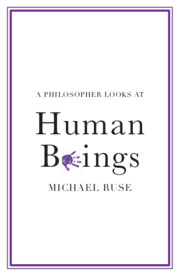Book contents
- A Philosopher Looks at Human Beings
- A Philosopher Looks at
- A Philosopher Looks at Human Beings
- Copyright page
- Dedication
- Contents
- Acknowledgments
- Introduction
- 1 The Status of Humans
- 2 Mechanism versus Organicism
- 3 Darwinian Evolution
- 4 Mechanism and Human Nature
- 5 Organicism and Human Nature
- 6 The Problem of Progress
- 7 Morality for the Organicist
- 8 Morality for the Mechanist
- Epilogue
- Bibliography
- Index
Introduction
Published online by Cambridge University Press: 20 May 2021
- A Philosopher Looks at Human Beings
- A Philosopher Looks at
- A Philosopher Looks at Human Beings
- Copyright page
- Dedication
- Contents
- Acknowledgments
- Introduction
- 1 The Status of Humans
- 2 Mechanism versus Organicism
- 3 Darwinian Evolution
- 4 Mechanism and Human Nature
- 5 Organicism and Human Nature
- 6 The Problem of Progress
- 7 Morality for the Organicist
- 8 Morality for the Mechanist
- Epilogue
- Bibliography
- Index
Summary
I am a human being. What do I, as a philosopher, have to say about this? If I were a physiologist, I would be interested in what makes us tick – how the various parts of the body interact and work together. If I were a sociologist, I would be interested in humans in groups – why are there churches and priests and imams and that sort of thing? I am a philosopher, so what am I interested in and why do I have special authority or knowledge to speak about such things? We’ll pick up on the second part of the question as we go along – the proof of the pudding is in the eating – but I’ll tell you what I am interested in. Why do we humans think we are so special? Do we have good reason for this, or is it just self-deception based on ignorance and arrogance or (perhaps) a fear that we are not so very special?
- Type
- Chapter
- Information
- A Philosopher Looks at Human Beings , pp. 1 - 4Publisher: Cambridge University PressPrint publication year: 2021

